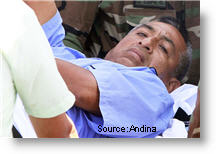 Peruvian security forces Sunday captured the leader of the Shining Path remnant group in the Upper Huallaga Valley, the last remaining member of the rebel group’s central committee to be captured.
Peruvian security forces Sunday captured the leader of the Shining Path remnant group in the Upper Huallaga Valley, the last remaining member of the rebel group’s central committee to be captured.
The government said that Florindo Eleuterio Flores Hala, known as “Comrade Artemio,” was injured in a conflict with Peruvian police and the military. Rebels managed to get Artemio to a village medical post in Santa Rosa de Mishollo, where he was treated for gunshot wounds before going into hiding. Afterwards, President Ollanta Humala authorized a mission, known as “Operation Peru,” to capture Artemio.
The operation took four days, and on Sunday Humala confirmed to state-run TV Peru that a badly wounded Flores had been captured in Tocache, located in the north central jungle of San Martin region.
“We have captured alive the criminal terrorist Artemio,” said Humala. “Mission accomplished.”
The arrest is a major blow to the Shining Path faction in the Upper Huallaga Valley, where Flores led the Proseguir, “or to continue,” group’s remaining 200-300 insurgents.
The group, which bears little resemblance to the original Shining Path, had been weakened in recent years and Flores had given interviews to media saying that he recognized the Shining Path’s military defeat and was seeking a truce with the government.
The government rejected a request to hold talks with Flores, who is accused of being closely linked to the country’s flourishing drug trade. Peru is the world’s biggest producer of cocaine, the U.S. government said last October.
In 2010, the U.S. government announced a million dollar award for the capture of Artemio, placing him on its narcotics reward program. “Flores Hala himself is involved in the local cocaine trade in the Huallaga Valley, since he repeatedly invests his own and/or [Shining Path] money in drug trafficking ventures with local drug traffickers,” the U.S. State Department said.
The Shining Path reached its peak in the late 1980s and early 1990s as the violent Maoist insurgency looked to overturn the Peruvian state. The group was founded in 1980 by Abimael Guzman, a philosophy professor who called for the country to be drenched in “rivers of blood.”
Approximately 70,000 people were killed in the conflict, with about 54 percent killed by the Shining Path, according to a Truth and Reconciliation Commission.
“The capture of Artemio is a step for Peru to close a violent and hurtful chapter of its history and ensure a bright future on the base of democracy, security and opportunity for all its citizens,” the U.S. embassy in Peru said in a statement Monday.
While the arrest of Flores is an important step in dismantling the Shining Path in the Upper Huallaga, many analysts say that the cocaine trade will likely continue to prosper until the government takes further actions to tackle drug traffickers.
Former Defense minister Roberto Chiabra said it was time to focus on combating illegal drug trafficking.
The country’s principal security threat is narcotics traffic, Chiabra said, and called on the government to refrain from centering on terrorism as the main issue.
“What is important is the removal from circulation of a person who 15 or 20 years ago might have been described as the head of the regional Huallaga committee [of Shining Path], but today we are talking about a hit man related to drug traffic,” Chiabra said.
Gustavo Gorriti, a veteran journalist who recently interviewed Flores, said the Shining Path faction in the Apurimac and Ene river valley, or VRAE, may look to take over control of the Upper Huallaga now with Flores out of the picture.
“With the vacuum, they are going to try, there is no doubt,” Gorriti told Ideeleradio. “They have actually already tried twice, and the last time was very serious.”
The VRAE is Peru’s top coca growing region, recently overtaking the Upper Huallaga. That splinter group is seen as more violent, regularly launching deadly attacks on Peruvian police and military.






Being a United States citizen & having traveled Peru extensively, I have spoken to members of the infamous Shinning Path & they knowing I was from the U.S.A. spoke to me candidly & in no way were they hostile towards me. All they talked about was their love for Peru & its people but did not have much good to say about Government leaders, the police, & who really controls them. From what I gathered, they are sick & tired of being treated like numbers instead of human beings & actually had no desire to hurt anyone & that most of the news spreading around had nothing to do with the Shinning Path. Sounded like people I’ve talked with in the U.S. from being tired of high gas prices, health insurance cost, etc,etc. Since Peru is by far nothing like the U.S. Peru’s leaders can do pretty much as they please, a police state? & as we all know, their police are on the take from anyone with power-$$$. Those bombs going off & killing innocent people are far exagerated said one woman & to please do not believe everything we hear. After a casual two hour visit with them, I was left with a sorrow for them because I saw nothing hostile about them, only normal Peruvians seeking justice from a corrupt country controlled by crooked leaders. This is what I heard & saw & in no way does it reflect truth or untruth.